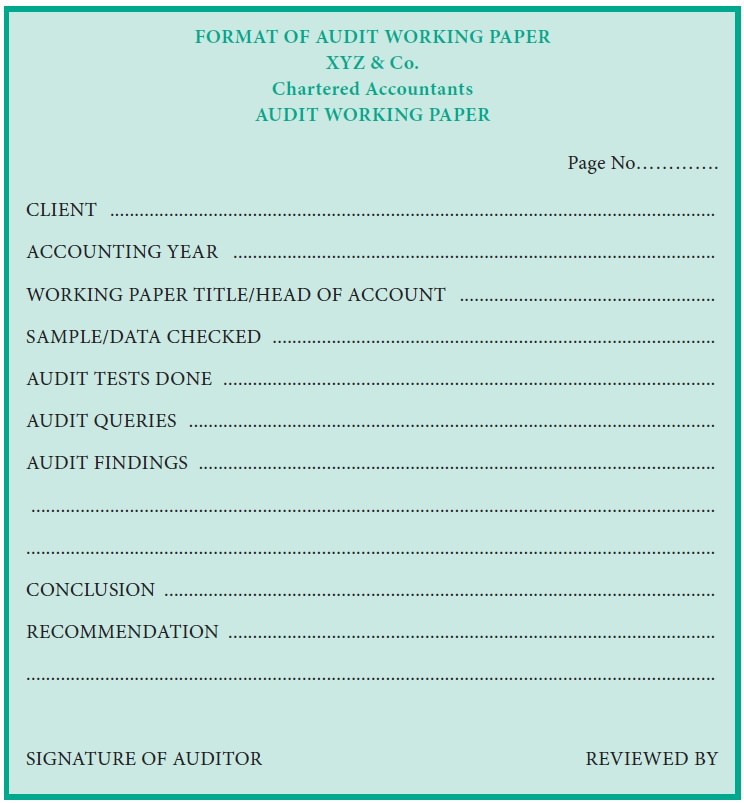Meaning, Definition, Contents, Objectives, Importance (or) Advantages | Auditing - Audit Working Papers | 11th Auditing : Chapter 5 : Documentation
Chapter: 11th Auditing : Chapter 5 : Documentation
Audit Working Papers
Audit Working Papers
Meaning
Papers and documents which contain important facts
about accounts which are under audit are called as Audit Working Papers.
Working papers provide the basis of conclusions and summarizations of the
report prepared by the auditor at the end of the audit work. As per SA-230
“Audit Documentation” audit working paper refers to the documents proposed or
obtained by the auditor and retained by him in connection with the performance
of his audit.
The term ‘audit working paper’ mean the written
paper and document containing details about accounts which are under audit,
analysis, summaries and comments built up by an auditor during the course of a
particular audit engagement.
Thus, all the documents gathered or prepared by
auditors during the course of an audit constitute audit working papers, but
broadly these are two types:
·
Working papers prepared
by the auditor himself, like audit note book, audit program, details of queries
made and their explanations thereof.
· Working
papers collected by the auditor from
the client, like schedule of debtors and creditors, management representations,
confirmations etc.,
Definition
Institute
of Chartered Accountants of India defines audit working paper as, “working paper must include audit
program, queries, explanations given for the queries, schedules for the
important items like depreciation, inventories, confirmation from third
parties, certificates issued by the management, banks,etc..”.
Prof.
Meigs, “the term working paper is
a comprehensive one and includes all the evidences gathered by the auditor to
show the work he has done, the methods and procedures he has followed and the
conclusions he has developed”.
Guidelines of Audit Working Papers as specified in SA-230, Audit
Documentation
Working Papers prepared or obtained
by the auditor in connection with the performance of audit are the property of
auditor and it is the duty of the auditor to retain and preserve the working
papers for a period of 7 years.
According
to A.W. Johnson, “Audit working
papers are written, private material which the auditor prepares for each audit.
They describe the accounting information used, his conclusions (and reasons
thereof) and the financial statements.”
Contents of Audit Working Papers
The documents obtained in the conduct of audit
constitute the audit working papers. The content of audit working papers varies
depending on the type and scope of audit. Auditing and Assusrance Statndards
(AAS 3) issued by the Institute of Chartered Accountatns of India states
working papers should record the auditors plan, the nature, timing and extent
of the audit procedure performed and the conclusions obtained from the
evidence.
In general audit working papers consists of the
following:
1. Schedule of Debtors, Creditors and bank
statement.
2. Correspondences and balance confirmations from
Debtors, Creditors and bankers.
3. Correspondences from legal advisors and
statutory authorities.
4. Certificates of officials with regard to bad
debts.
5. Certificate from valuers for valuing
stock-in-trade and investments.
6. Certificate confirming cash balance.
7. Certificate from authorized person with regard
to outstanding assets and liabilities, contingent assets and liabilities etc.
8. Bank Reconciliation statement.
9. Adjusting entries.
10. Copies of the minutes of the meeting of
directors and shareholders.
Objectives of Audit Working Papers
1.
Planning
and Organizing Audit Work: Working
papers provide a means of planning, organizing and reviewing the audit work.
They are the evidence for conducting the audit work against the generally
accepted auditing standards and practices.
2.
Support
for Auditor’s Opinion: Working papers
provide support for the report of the auditor. When the auditor’s opinion on
financial statement or recommendations given by the auditor is questioned
working papers support the opinion or recommendations given by the auditor.
3.
Division
of Labour: Working papers help in
dividing the audit work among the audit staff so that each staff is responsible
for his work to the auditor.
4. Use as a Permanent Record: Working papers are the permanent record of the
auditing procedure employed and the financial records examined during the
conduct of audit.
5. Basis for Evaluation and Training of Audit Staff: Working
papers provide a means to test
whether the auditor and his staff have done their job as per the standards.
Training to the staff can be provided by reviewing the working papers of past
years.
Importance (or) Advantages Of Audit Working Papers
1. Planning the Audit Work: It acts
as the process of planning for the
auditor so that he can estimate the time that is required for conducting the
audit work.
2. Helps in Fixing Responsibility: It helps
in fixing responsibility and to
measure the work being performed by the audit assistants.
3. Helps in Drawing Conclusions: Working
papers are necessary to draw conclusion from the evidence obtained.
4. Helps in Preparing Audit Report: The
auditor prepares and finalises the audit report taking into account the
informations or extracts contained in the working papers.
5. Documentary Evidence: It is a
valuable documentary evidence in the
Court or Tribunal of law when a charge of negligence is brought against the
auditor.
6. Permanent Record: Working
papers are the permanent record of
the work done by the auditor during a particular period of time.

Related Topics